 An exterior view, from the entrance, of the Youville shops. The brown building on the right is the original Crémazie bus facility; the new building, on the left, deals with the metro.
| |
 The Youville shops are located at 8845, boul. St-Laurent, at the corner of boul. Crémazie, near metro Crémazie.
|  The lobby of the Youville shops.
|
 In addition to the metro, the Youville shops continue their original vocation by serving the STM's bus system.
|  The upper floors at the Youville shops contain a variety of administrative offices and company services, including a print shop and this facility, the uniform store. Uniformed employees can customize their uniforms at their discretion.
|
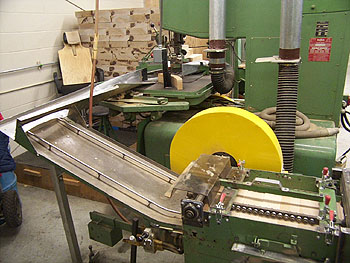
| 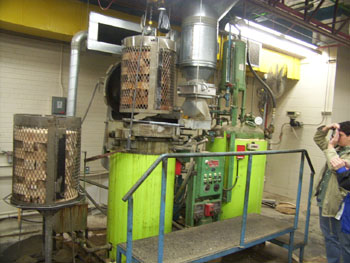
|
| One of the workshops is devoted to an essential part of the metro wheelbase: the brake shoe. These shoes are carved from Quebec-grown yellow birch, and impregnated under pressure with peanut oil to prevent burning. The oil's burning point is so high that old shoes cannot be incinerated. On the left is a precision saw to carve the curved shoes; on the right is the device that saturates the shoes with oil.
| |

| 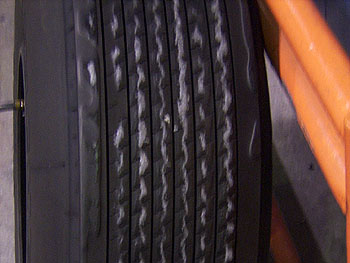
|
| Another workshop is for the maintenance of tires. Each main tire, supplied by Michelin and Bridgestone, is worth $700. New tires and ones in use are rigorously tested for leaks and weakness. New tires are first used on the motor cars, then transferred to the trailers. Tires are filled with inert nitrogen gas. On the right, you can see the wear a tire can sustain.
| |
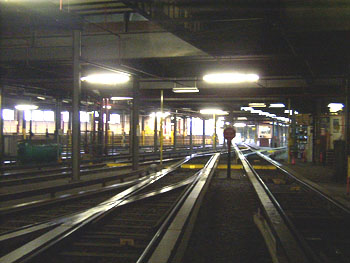
| 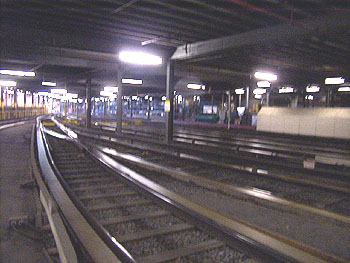
|
| These ladder tracks inside the Youville shops are used to store incoming trains and redirect them to the minor and major repairs workshops. The shops have two outlets: one between Sauvé and Crémazie metro on the orange line, and another one, including a testing track under Jarry Park, exiting between Parc and De Castelnau metro on the blue line.
| |
 This is the portal entering the garage from the Sauvé-Crémazie connecting track.
| 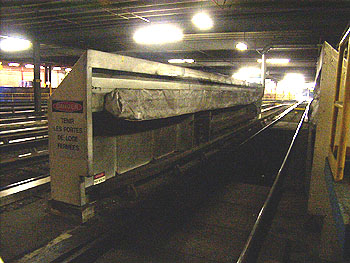 Formerly, apparatus used to dust trains' undercarriages had to be used manually. This automatic dust-removal system is computer-controlled to ensure that rugged components receive more air pressure and delicate ones receive less pressure.
|
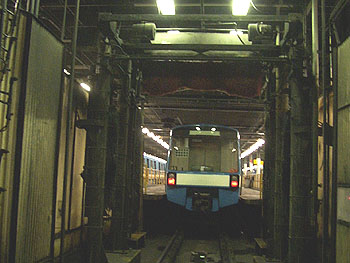 The ladder tracks are located behind the minor repairs workshop, or Atelier de petites révisions (PR). Here a train enters PR.
|  One of the trains stored in PR is a special vacuum train used to suck garbage and debris out of tunnel beds.
|
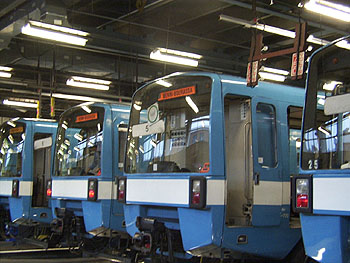 A row of trains undergoing repairs in PR.
| 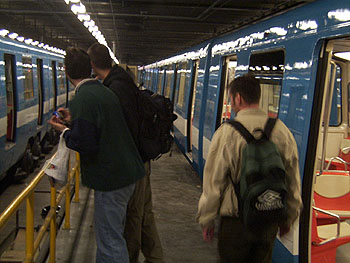 This raised dock is used for inspecting trains in PR and for minor repairs to the train's interior.
|
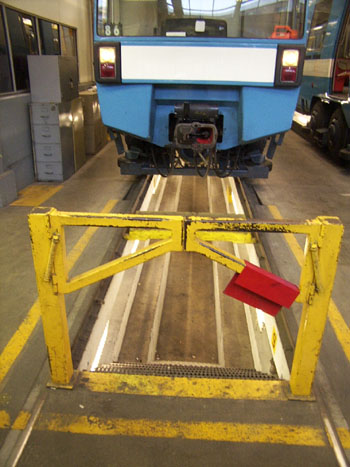
| 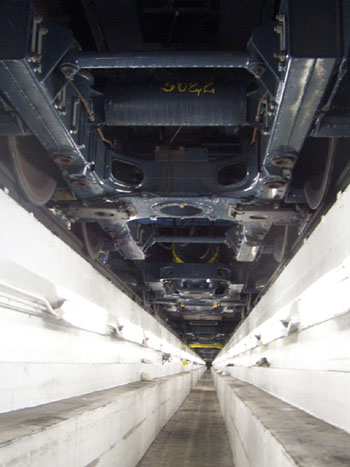
|
| Repair pits under the tracks in PR give access to the trains' undercarriage, engine, brakes, and wheels. The PR workshop is used for minor and routine maintenance such as cleaning the train's exterior, replacing brake shoes and tires, and maintenance of the train's interior such as cleaning and replacing signage and car cards.
| |
 Larger and more complicated repairs of the trains' systems and structure take place in the major repairs workshop, or Atelier de grandes révisions (GR).
| |
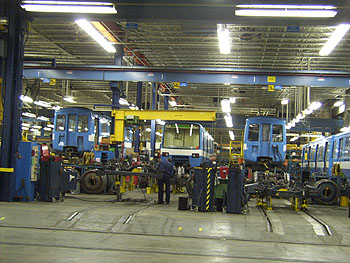 A closer view of trains undergoing repairs in GR.
| 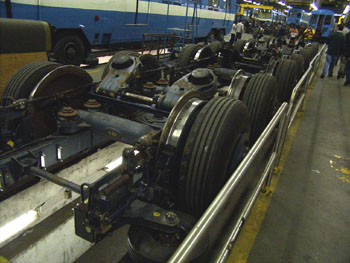 This bogie, or wheelbase, has been removed from a train's chassis for maintenance.
|
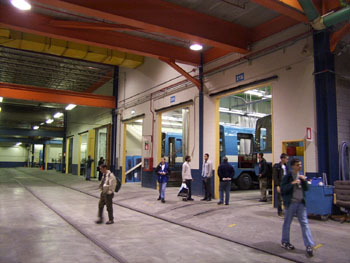 The rear of GR is sectioned into bays used for various kinds of repair work on individual cars.
| 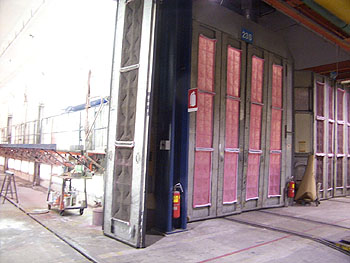 The hard-wearing paint used on train exteriors is so toxic when first applied that the painting bay must be sealed off.
|
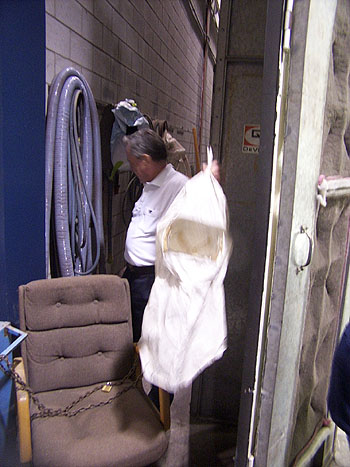 This GR worker is donning a protective garment before entering the painting bay.
| 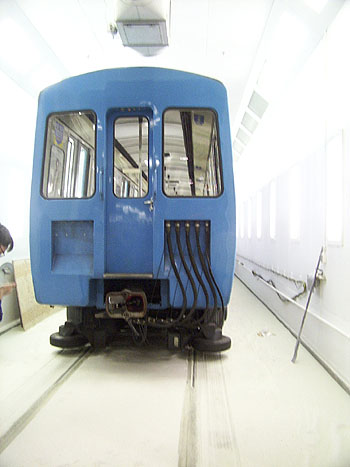 Another kind of maintenance that can be carried out in GR is sandblasting. Note the layer of sand all over the floor of this bay.
|
 This bridge between the GR's repair tracks and the maintenance bays. Individual cars are towed onto the bridge, the bridge is moved in front of the appropriate bay, and the car is towed off into the bay.
| 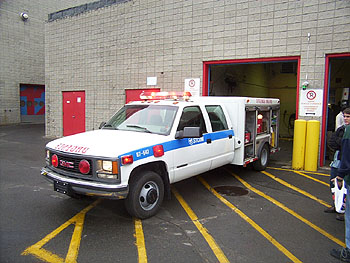 Finally, another function of the Youville Shops is as a base for Urgence-Métro, an emergency service with surface vehicles equipped to deal with train breakdowns, medical emergencies, and other kinds of problems that can happen in the metro.
|